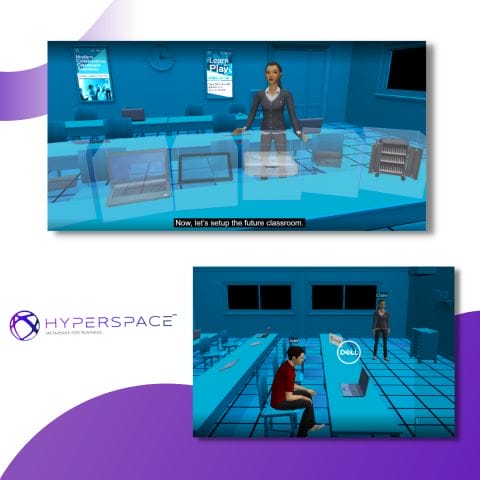The Metaverse, a hypothetical future iteration of the internet, is set to revolutionize the way we live, work, and play. By integrating virtual reality, augmented reality, and other immersive technologies, the Metaverse creates a shared virtual space that has the potential to transform various aspects of our lives. From gaming and entertainment to e-commerce and education, the Metaverse holds immense possibilities for the future.
Companies like Facebook and Microsoft have already invested in developing VR and AR technologies, recognizing the significant impact that the Metaverse can have on society. As we explore the potential of this revolutionary concept, we uncover new opportunities, benefits, and implications that will shape our digital future.
Key Takeaways:
- The Metaverse integrates virtual reality, augmented reality, and other immersive technologies to create a shared virtual space.
- Companies like Facebook and Microsoft are investing in the development of Metaverse technologies.
- The Metaverse has the potential to revolutionize gaming, entertainment, e-commerce, education, and work.
- The concept of the Metaverse was first introduced in Neal Stephenson’s novel Snow Crash.
- The Metaverse offers enhanced user experiences, increased accessibility, and new revenue streams.
A Brief History of the Metaverse
The concept of the Metaverse has captured the imagination of technologists and futurists for decades, but its origins can be traced back to Neal Stephenson’s groundbreaking novel, Snow Crash, published in 1992. In the book, Stephenson introduces a virtual reality universe called the Metaverse, where users can interact with each other in a shared digital space.
“The thing that would make the Metaverse work – the thing without which it would be a big a waste of time as television itself – is that people would be in it…A few thousand years of development have gone into the hardware and software requisite to immerse one’s senses in cyberspace. Gloves, goggles, bodysuits…all these things take advantage of the fact that the human nervous system itself is the most elaborate, efficient…highly adapted data-reduction system the world has ever seen.” – Neal Stephenson, Snow Crash
While Snow Crash introduced the concept, it is in the years since its publication that advancements in virtual reality (VR) and augmented reality (AR) technologies have brought us closer to realizing a fully immersive Metaverse experience. Platforms like Second Life and World of Warcraft were precursors to the idea of virtual worlds, where users could create avatars and interact with others in vast digital landscapes.
Today, the development of the Metaverse continues, propelled by the efforts of tech giants such as Facebook and Microsoft, as well as a vibrant ecosystem of startups and innovators. With ongoing advancements in VR, AR, and other immersive technologies, the dream of a fully realized Metaverse is inching closer to reality.
Revolutionary Use Cases of the Metaverse
The Metaverse, with its immersive virtual reality and augmented reality technologies, has the potential to revolutionize various industries and applications. Let’s explore some of the most exciting use cases of the Metaverse:
Metaverse Gaming
Gaming is one of the most prominent areas where the Metaverse is expected to make a significant impact. Imagine stepping into a virtual world where you can fully immerse yourself in interactive gameplay, collaborate with other players, and explore incredible virtual environments. The Metaverse can take gaming experiences to a whole new level, blurring the boundaries between the real and virtual worlds.
Metaverse Education
The Metaverse has the power to transform education by providing immersive and personalized learning experiences. Students can explore virtual environments, interact with digital simulations, and engage in collaborative projects with peers from around the world. This level of immersion can greatly enhance the educational process and make learning more accessible and engaging for learners of all ages.
Metaverse Virtual Real Estate
The concept of virtual real estate has gained traction in the Metaverse, where users can buy, sell, and own virtual land and properties. Just like in the real world, virtual real estate presents opportunities for investment, development, and creativity. Users can design and customize their virtual spaces, creating unique environments for various purposes, such as social gatherings, events, or even virtual businesses.
Metaverse Virtual Conferences
Virtual conferences have become increasingly popular, offering a flexible and accessible way for people to attend events from anywhere in the world. With the Metaverse, conferences can take on a whole new level of interactivity and engagement. Imagine attending a virtual conference where you can explore a virtual exhibition hall, interact with exhibitors, and network with other attendees, all within an immersive and interactive digital environment.
The Metaverse holds immense potential for transforming various industries and applications, from gaming and education to virtual real estate and virtual conferences. As technology continues to advance, we can expect even more exciting and innovative use cases to emerge, reshaping how we work, learn, and connect in the digital world.
Benefits of the Metaverse
The Metaverse offers a range of benefits that enhance the user experience and open up new possibilities across various industries. One key advantage is the enhanced user experience through immersive and interactive environments. By integrating virtual reality, augmented reality, and other immersive technologies, the Metaverse provides a more engaging and realistic digital experience. Users can explore virtual worlds, interact with others, and participate in activities that were previously limited to the physical realm.
In addition to enhancing the user experience, the Metaverse also increases accessibility. With virtual environments, individuals can participate from anywhere in the world, breaking down geographical barriers and allowing people to connect and collaborate globally. This increased accessibility promotes inclusivity and expands opportunities for education, business, and social interaction.
The Metaverse stimulates innovation and creativity by providing a platform for experimentation and new ideas. Developers and creators can build and design unique virtual experiences, pushing the boundaries of what is possible in the digital realm. This fosters a dynamic ecosystem where new applications, games, and services can be developed, driving technological advancements and pushing the limits of imagination.
Furthermore, the Metaverse opens up new revenue streams through the sale of virtual goods and experiences. Virtual real estate, digital fashion, and other virtual products can be bought and sold within virtual environments, providing opportunities for businesses and individuals to monetize their creations. This creates a thriving virtual economy and expands the possibilities for entrepreneurship and financial success.
Benefits of the Metaverse at a Glance:
- Enhanced user experience through immersive and interactive environments
- Increased accessibility, allowing participation from anywhere in the world
- Promotes innovation and creativity for developers and creators
- Creates new revenue streams through the sale of virtual goods and experiences
The Metaverse also fosters social connection, enabling users to interact with others in a shared digital space. Whether it’s attending virtual events, collaborating on projects, or simply socializing with friends, the Metaverse brings people together, allowing for meaningful connections and fostering a sense of community.
Overall, the benefits of the Metaverse are wide-ranging and have the potential to revolutionize how we engage with digital environments. From enhanced user experiences to increased accessibility, innovation, and new revenue streams, the Metaverse offers exciting possibilities for individuals, businesses, and society as a whole.
Economic Implications of the Metaverse
The Metaverse, with its immersive virtual environments and interconnected digital spaces, has far-reaching economic implications. Industries are evolving to tap into the potential of the Metaverse, creating new opportunities for revenue generation and job creation. Let’s explore some key areas that showcase the economic impact of the Metaverse.
Virtual Real Estate
One of the most notable economic implications of the Metaverse is the emergence of virtual real estate markets. Just as physical land holds value in the real world, digital land is becoming a valuable asset in the Metaverse. Users can buy, sell, and develop virtual properties, creating an economy that mirrors the real estate market. The value of virtual land depends on factors like location, accessibility, and popularity, presenting opportunities for investment and entrepreneurship.
Digital Fashion
Another significant aspect of the Metaverse’s economic impact is the rise of digital fashion. As users navigate virtual spaces, they have the opportunity to express themselves through customizable avatars and virtual clothing. Designers and brands are capitalizing on this trend by creating and selling digital fashion items, such as virtual clothing and accessories. This emerging market creates revenue streams for designers, fashion houses, and platforms that facilitate digital fashion transactions.
Virtual Tourism
The Metaverse opens up new possibilities for the travel industry with the concept of virtual tourism. Users can now explore virtual destinations and experience immersive travel experiences without leaving their homes. This presents opportunities for travel companies to offer virtual tours, immersive cultural experiences, and unique digital destinations. Virtual tourism generates revenue through ticket sales, sponsorship deals, and partnerships with virtual platforms.
“The Metaverse has given rise to a thriving digital economy, with virtual real estate, digital fashion, and virtual tourism leading the way. These emerging markets create exciting revenue streams and job opportunities.”
The Metaverse’s economic implications go beyond these key areas. It has the potential to transform various industries, including entertainment, e-commerce, advertising, and more. As the Metaverse continues to evolve and grow, new revenue models and business opportunities will emerge, shaping the future of the digital economy.
| Metaverse Economic Implications | Description |
|---|---|
| Virtual Real Estate | The buying, selling, and development of digital land in the Metaverse. |
| Digital Fashion | The creation and sale of virtual clothing and accessories. |
| Virtual Tourism | Exploring virtual destinations and offering immersive travel experiences. |
Governance and Regulation in the Metaverse

The emergence of the Metaverse raises important questions about governance and regulation in virtual spaces. As the Metaverse transcends physical boundaries, jurisdictional issues become a significant challenge. Unlike the traditional internet, which operates within the confines of national borders, the Metaverse exists in a global realm where the laws of one country may not apply uniformly.
To navigate this complex landscape, it is crucial to establish international frameworks that address jurisdictional concerns and promote cooperation among governments. This will ensure that users’ rights and privacy are protected across virtual spaces. Additionally, defining clear rules and regulations for the Metaverse will help foster a safe and secure environment for all participants.
Digital identity and privacy are paramount in the Metaverse. As users engage in virtual interactions, they leave behind sensitive data that must be safeguarded. Robust mechanisms for protecting digital identities and privacy should be put in place to prevent unauthorized access and misuse of personal information.
“We need to establish a comprehensive governance framework that ensures the responsible and ethical use of the Metaverse while protecting user rights and privacy.”
Digital citizenship is another concept that arises in the Metaverse. It raises questions about the rights and responsibilities of individuals within virtual communities. As the Metaverse continues to evolve, there is a need to explore and define the notion of digital citizenship and establish guidelines for participants to engage responsibly and ethically in virtual environments.
| Key Considerations for Metaverse Governance | Challenges | Solutions |
|---|---|---|
| Jurisdictional Issues | Differing legal frameworks across countries and lack of uniform regulations | Establish international frameworks for cooperation and jurisdictional harmonization |
| Digital Identity and Privacy | Risk of data breaches and unauthorized access to personal information | Implement robust security measures to protect digital identities and privacy |
| Digital Citizenship | Undefined rights and responsibilities in virtual communities | Explore the concept of digital citizenship and establish guidelines for responsible engagement |
Governments and stakeholders must work collaboratively to address these governance and regulation challenges in the Metaverse. By doing so, we can ensure that the potential of the Metaverse is harnessed responsibly, benefiting individuals, communities, and society as a whole.
Education and Skill Development in the Metaverse
The Metaverse has the potential to revolutionize education and skill development, offering immersive learning experiences that transcend traditional classrooms. Through virtual reality and augmented reality technologies, students can engage with educational content in a more interactive and personalized way.
Immersive learning in the Metaverse allows for a deep dive into various subjects, making education more engaging and enjoyable. Students can explore historical sites, conduct scientific experiments, and simulate practical scenarios, all within a virtual environment that enhances their understanding and retention of knowledge. Personalized learning becomes possible, as the Metaverse can adapt to individual learning styles, pace, and preferences. Whether it’s visual, auditory, or kinesthetic learning, the Metaverse can cater to diverse needs and create a more inclusive education system.
Collaboration is another vital aspect of education in the Metaverse. Students from different parts of the world can come together in virtual classrooms, fostering global connections and cross-cultural understanding. Through collaborative projects and discussions, students can develop essential teamwork and communication skills, preparing them for the increasingly interconnected global workforce. The Metaverse also opens up new avenues for educators, allowing them to create innovative and interactive learning experiences that go beyond traditional teaching methods.
Advantages of Education in the Metaverse
- Immersive and interactive learning experiences.
- Personalized learning tailored to individual preferences and pace.
- Global collaboration and cross-cultural understanding.
- Innovative teaching methods and interactive content.
- Increased accessibility and educational equity.
The Metaverse represents a paradigm shift in education, offering endless possibilities for immersive and collaborative learning. As technology continues to advance, the integration of the Metaverse into educational frameworks will play a crucial role in preparing students for the future.
Challenges and Obstacles in the Metaverse

The Metaverse presents a range of challenges and obstacles that need to be addressed to ensure its responsible and ethical development. These challenges include jurisdictional issues, digital identity concerns, privacy considerations, ethics, and governance.
Jurisdictional Issues: The global nature of virtual spaces in the Metaverse raises complex jurisdictional questions. Determining which laws and regulations apply can be challenging, as virtual environments transcend physical borders. This poses challenges in enforcing legal frameworks, protecting users’ rights, and addressing transnational disputes.
Digital Identity and Privacy Concerns: In the Metaverse, users interact and leave behind a wealth of personal data. Protecting digital identity and privacy becomes paramount, as user information can be collected, exchanged, and potentially vulnerable to cyber threats. Robust security measures and strict privacy regulations are necessary to safeguard user data and maintain user trust.
“The Metaverse creates a unique set of challenges in terms of governance, privacy, and user protection. It is critical to establish frameworks that prioritize user rights and data privacy while enabling the benefits of this immersive digital space.”
Ethics and Governance: The Metaverse raises important ethical considerations regarding user rights, the concentration of power, and the potential for exploitation. As the Metaverse continues to evolve, it is essential to establish ethical guidelines and responsible governance frameworks that ensure fairness, inclusivity, and transparency for all users. These frameworks should address issues such as content moderation, algorithmic biases, and the equitable distribution of resources within the Metaverse.
Addressing these challenges and obstacles is essential to create a Metaverse that maximizes its benefits while minimizing potential risks. Collaborative efforts between governments, industry stakeholders, and user communities are crucial to shaping the development of the Metaverse in a manner that aligns with societal values and safeguards user well-being.
Implications for Society and Future Growth of the Metaverse
The Metaverse holds immense implications for society, ushering in a new era of digital interaction and transforming various aspects of our lives. This shared virtual space has the potential to reshape industries, create economic opportunities, and enhance social connections. As we explore the future growth of the Metaverse, it becomes clear that technological advancements will play a crucial role in its development and adoption.
The societal implications of the Metaverse are vast. It has the power to revolutionize how we live, work, and play. In terms of work, the Metaverse can enable remote collaboration and virtual offices, offering flexibility and efficiency. It opens up new avenues for entertainment, with immersive gaming experiences and virtual events. Additionally, the Metaverse has the potential to amplify education, providing immersive and interactive learning environments for personalized and globalized education.
The Metaverse has profound implications for society, transforming how we live, work, and play.
Looking ahead, the future growth of the Metaverse is promising. Technological advancements in virtual reality, augmented reality, and artificial intelligence will drive innovation and expand the capabilities of the Metaverse. As these technologies become more accessible and affordable, more individuals and businesses will be able to participate in this digital revolution. The Metaverse has the potential to become an integral part of our daily lives, affecting how we socialize, shop, learn, and conduct business.
However, with this growth comes the responsibility to address ethical considerations, privacy concerns, and governance challenges. As the Metaverse evolves, it will be essential to establish regulations that protect user privacy, digital identity, and ensure equitable access for all individuals. By taking a proactive approach and fostering collaboration between technology companies, governments, and users, we can shape the future of the Metaverse in a way that benefits society as a whole.
The Future Growth of the Metaverse
The future growth of the Metaverse is dependent on technological advancements and the collective efforts of stakeholders to shape its development. As virtual reality, augmented reality, and other immersive technologies continue to evolve, the possibilities for the Metaverse are virtually limitless. From enhanced gaming experiences to virtual travel and immersive learning, the Metaverse holds the potential to transform various industries and redefine how we interact with digital environments.
For businesses, the Metaverse presents new opportunities for innovation and revenue generation. Companies can leverage the Metaverse to create unique and immersive customer experiences, driving customer engagement and loyalty. Virtual real estate, virtual fashion, and virtual tourism are just a few examples of industries that can thrive within the Metaverse, offering new avenues for growth and profitability.
Furthermore, the future growth of the Metaverse will also rely on the adoption and acceptance of this technology by individuals. As more people become familiar with virtual reality and augmented reality, the barriers to entry for the Metaverse will continue to decrease. With increased accessibility and affordability, individuals will have the opportunity to explore and engage with the Metaverse, contributing to its expansion and evolution.
| Implications | Society | Future Growth | Technological Advancements |
|---|---|---|---|
| Work | Remote collaboration and virtual offices | Innovation and expansion | Virtual reality, augmented reality, artificial intelligence |
| Entertainment | Immersive gaming experiences and virtual events | Enhanced customer experiences | Virtual reality, augmented reality, artificial intelligence |
| Education | Immersive and interactive learning environments | New opportunities for growth | Virtual reality, augmented reality, artificial intelligence |
| Regulation | Establishing privacy protections and equitable access | Collective efforts of stakeholders | Collaboration between technology companies, governments, and users |
Conclusion
The rise of the Metaverse promises economic opportunities, transformative education, and societal impact. This integration of virtual reality and augmented reality technologies has the potential to revolutionize various aspects of our lives. From gaming and entertainment to education and work, the Metaverse is expected to reshape industries and create new possibilities.
However, with great potential comes great responsibility. Governance, regulation, and ethical considerations need to be addressed to ensure the responsible development and use of the Metaverse. Jurisdictional issues, digital identity, privacy concerns, and ethical implications are just a few of the challenges that stakeholders must navigate.
As technological advancements continue to evolve, the growth and impact of the Metaverse will also expand. It is essential for governments, businesses, and individuals to collaborate and shape the development of the Metaverse in a way that maximizes its benefits for society while overcoming obstacles. By doing so, we can harness the full potential of the Metaverse and create a future that is both immersive and responsible.
FAQ
What is the Metaverse?
The Metaverse is a hypothetical future iteration of the internet that integrates virtual reality, augmented reality, and other immersive technologies to create a shared virtual space.
What are the applications of the Metaverse?
The Metaverse has the potential to revolutionize various aspects of our lives, including gaming, entertainment, e-commerce, education, and work.
Where did the concept of the Metaverse originate?
The concept of the Metaverse was first introduced in Neal Stephenson’s 1992 novel Snow Crash.
What are the benefits of the Metaverse?
The Metaverse offers enhanced user experience, increased accessibility, innovation and creativity, new revenue streams, and social connection.
What are the economic implications of the Metaverse?
The Metaverse creates new industries, job opportunities, and revenue streams, including virtual real estate, digital fashion, and virtual tourism.
What are the governance and regulation challenges in the Metaverse?
The Metaverse poses challenges related to jurisdictional issues, protecting digital identity and privacy, and establishing frameworks for responsible use.
How does the Metaverse impact education and skill development?
The Metaverse makes learning more accessible, enhances engagement and retention, and fosters global connections and cross-cultural understanding.
What are the challenges and obstacles in the Metaverse?
The Metaverse faces challenges such as jurisdictional issues, digital identity and privacy concerns, ethical considerations, and the need for governance and regulation.
What are the implications for society and the future growth of the Metaverse?
The Metaverse has the potential to transform how we live, work, and play, and its future growth depends on technological advancements and responsible navigation by stakeholders.





